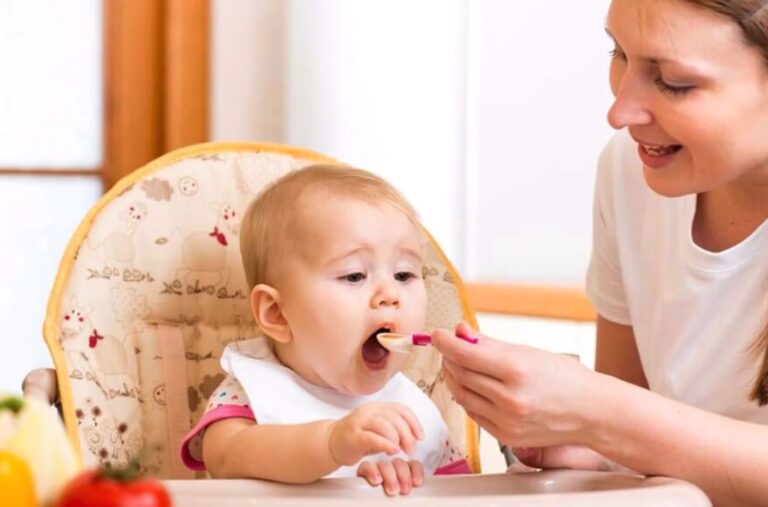Is Nutritional Yeast Healthy for Babies?

Nutritional yeast is generally considered healthy for babies, but moderation is key. Nutritional yeast is a valuable source of vitamins and minerals that can support a baby’s growth and development.
However, it should be introduced in small amounts and gradually to ensure the baby’s digestive system can tolerate it. Additionally, it’s important to choose a reputable brand and consult with a pediatrician before adding nutritional yeast to a baby’s diet.
Overall, nutritional yeast can be a nutritious addition to a baby’s diet, but caution and monitoring are necessary for optimal health.
Nutritional Composition Of Yeast:
- Rich in B vitamins: Nutritional yeast is a great source of B vitamins, including thiamine (B1), riboflavin (B2), niacin (B3), pyridoxine (B6), and folate (B9). These vitamins play essential roles in energy production, metabolism, and overall well-being.
- Protein powerhouse: Nutritional yeast is a complete protein, containing all nine essential amino acids required for healthy growth and development. This makes it an excellent choice for those following a plant-based diet.
- Essential minerals: It also contains important minerals such as zinc, selenium, iron, and magnesium, which are crucial for various bodily functions.
- Fiber content: With a decent amount of dietary fiber, nutritional yeast supports digestive health and promotes feelings of fullness.
Different Forms Of Nutritional Yeast Available In The Market:
- Powdered form: This is the most common and versatile form of nutritional yeast. It can be easily sprinkled on popcorn, pasta, roasted vegetables, or incorporated into dressings and sauces.
- Flakes: Nutritional yeast flakes are larger in size and have a slightly different texture than the powdered form. These flakes can be directly sprinkled on salads, soups, or added to recipes for added flavor and nutrition.
- Liquid form: Some brands offer nutritional yeast in liquid form, which can be used as a marinade or added to recipes for a unique taste.
- Fortified nutritional yeast: Certain brands fortify their nutritional yeast with additional nutrients like vitamin B12, making it an even more nutrient-dense option.
Nutritional yeast is a nutritious and flavorful ingredient that adds a pleasant taste to various dishes. Its impressive nutritional composition and availability in different forms make it a popular choice for people looking to boost their nutrient intake.
Nutritional Yeast And Baby’s Health
Nutritional yeast can be a healthy addition to a baby’s diet, as it is rich in vitamins and minerals. However, it is important to consult with a pediatrician before introducing it to ensure it is suitable for your baby’s specific needs.
Nutritional yeast is gaining popularity as a beneficial addition to a healthy diet for people of all ages, including babies. It is a deactivated form of yeast, typically Saccharomyces cerevisiae, which is grown on sugar and molasses. Packed with essential nutrients, nutritional yeast has been praised for its potential health benefits for babies.
Let’s explore further:
Exploring The Potential Health Benefits Of Nutritional Yeast For Babies:
- Enhances immune function: Nutritional yeast contains beta-glucans, which are known for their immune-boosting properties. Consuming nutritional yeast may help strengthen your baby’s immune system, keeping them healthier and more resilient.
- Supports digestion: The high fiber content in nutritional yeast can aid in maintaining a healthy digestive system for your baby. It may help regulate bowel movements and prevent constipation, ensuring optimal gut health.
- Provides essential vitamins: Nutritional yeast is an excellent source of B-complex vitamins, including thiamine, riboflavin, and niacin. These vitamins are crucial for your baby’s growth and development, supporting energy production, brain function, and overall health.
Essential Nutrients Provided By Nutritional Yeast:
- Protein powerhouse: Nutritional yeast is an exceptional source of plant-based protein. It contains all nine essential amino acids required for your baby’s growth and development. Protein is essential for building and repairing tissues and plays a vital role in your baby’s overall growth.
- Trace minerals: Nutritional yeast is rich in minerals such as zinc, selenium, and manganese. These minerals are vital for various physiological processes in your baby’s body, including bone development, antioxidant defense, and enzyme function.
- Folic acid: Folic acid is crucial for proper brain and spinal cord development in infants. Nutritional yeast is a great source of naturally occurring folic acid, ensuring your baby gets enough of this essential nutrient.
Role Of Nutritional Yeast In Supporting Growth And Development:
- Healthy weight gain: The combination of protein, vitamins, and minerals found in nutritional yeast can contribute to healthy weight gain in babies, supporting their physical growth and development.
- Brain development: The B vitamins present in nutritional yeast are essential for brain development. They play a crucial role in the production of neurotransmitters, which facilitate proper brain function.
- Energy production: The B vitamins in nutritional yeast help convert food into energy, providing your baby with the fuel they need for healthy growth, physical activity, and cognitive development.
Potential Risks Or Allergenic Reactions:
While nutritional yeast is generally considered safe for babies, it’s essential to be aware of potential risks and allergenic reactions. Here are a few points to note:
Not suitable for babies with yeast allergies: If your baby has a known yeast allergy, nutritional yeast should be avoided. Consult with your pediatrician if you suspect an allergy or have concerns.
Start with small amounts: Introduce nutritional yeast gradually, starting with small amounts and observing your baby for any adverse reactions. If your baby shows signs of an allergic reaction, such as rash, wheezing, or digestive issues, stop using it and consult a healthcare professional.
It’s always recommended to consult your pediatrician before introducing any new food into your baby’s diet. Every baby is different, and individual needs may vary.
Incorporating Nutritional Yeast In Baby’s Diet
Incorporating nutritional yeast into a baby’s diet is a healthy choice as it is packed with essential nutrients like vitamins B12 and folic acid. Plus, it adds a savory flavor to their meals without the need for excess salt or artificial additives.
Give your baby a nutritious boost with this yeast.
Nutritional yeast has gained popularity in recent years due to its numerous health benefits. But is it safe for babies? In this section, we will explore how to incorporate nutritional yeast into a baby’s diet, ensuring age-appropriate introduction, recommended dosage, and frequency, various methods of inclusion, and even some delicious recipes.
Age-Appropriate Introduction Of Nutritional Yeast To A Baby’s Diet:
- Introducing nutritional yeast to your baby’s diet should only be done after they have reached 6 to 8 months old.
- Consult with your pediatrician before introducing nutritional yeast, especially if your baby has any underlying health conditions or allergies.
- Start with small amounts, around 1/4 teaspoon, and observe your baby’s reactions. Gradually increase the quantity if there are no adverse effects.
Recommended Dosage And Frequency:
- For babies between 6 to 8 months, start with a dosage of 1/4 teaspoon of nutritional yeast per day.
- Increasing the dosage to 1/2 teaspoon per day is suitable for babies aged 9 to 12 months.
- As babies grow older, the dosage can be gradually increased to 1 teaspoon per day.
Methods Of Incorporating Nutritional Yeast Into Baby’s Food:
- Mix a small amount of nutritional yeast with pureed fruits or veggies, such as apples, pears, sweet potatoes, or carrots.
- Sprinkle nutritional yeast on top of mashed avocado or spread it on toast fingers for a tasty snack.
- Stir nutritional yeast into soups, oatmeal, or yogurt to boost the nutritional content.
Incorporating nutritional yeast into your baby’s diet can provide essential vitamins and minerals, such as B vitamins and zinc. Remember to follow the recommended dosage, introduce it at an appropriate age, and consult with your pediatrician if you have any concerns.
With these guidelines in mind, you can enjoy exploring the various ways to include nutritional yeast in your baby’s meals.
Comparing Nutritional Yeast With Other Food Sources
Nutritional yeast is a healthy source of essential nutrients for babies. Compared to other food sources, it provides vitamins, minerals, and protein, supporting their growth and development. With its unique flavor and versatility, nutritional yeast can be easily incorporated into their diet.
Nutritional yeast is gaining popularity as a nutritious addition to various diets, including those of babies. As a parent, you may be wondering how nutritional yeast compares to other baby-friendly foods in terms of nutritional value, benefits, taste, and texture.
Let’s delve into these aspects to help you make an informed decision.
Comparison Of Nutritional Yeast With Common Baby-Friendly Foods:
- Breast Milk:
- Provides essential nutrients for a baby’s growth and development.
- Contains antibodies that support the immune system.
- Formula Milk:
- A viable alternative to breast milk, ensuring proper nutrition.
- Manufactured with various vitamins and minerals to support a baby’s needs.
- Fortified Cereals:
- Often recommended as a first solid food for babies.
- Enriched with essential vitamins and minerals to aid in their development.
- Fruits and Vegetables:
- Offer a wide range of vitamins, minerals, and dietary fiber.
- Introducing a variety of fruits and vegetables helps develop a diverse palate.
Nutritional Value And Benefits Compared To Other Sources:
- Nutritional yeast:
- Rich source of B vitamins, providing support for a baby’s nervous system and overall growth.
- Contains protein, iron, and zinc, aiding in healthy blood and cellular development.
- Common baby-friendly foods:
- Breast milk and formula milk provide optimal nutrition and support a baby’s immune system.
- Fortified cereals and fruits/vegetables offer a wide range of essential nutrients.
Taste And Texture Considerations For Introducing Nutritional Yeast To Babies:
- Nutritional yeast:
- Has a mild, cheesy flavor, making it a versatile ingredient for various baby food recipes.
- Possesses a fine, powdery texture that can be easily mixed into purees or sprinkled over dishes.
- Common baby-friendly foods:
- Breast milk and formula milk have familiar flavors and textures for babies.
- Fortified cereals offer different textural experiences and are available in various flavors.
Nutritional yeast offers unique nutritional benefits such as B vitamins, iron, and zinc. However, it should be considered as a supplement to a well-rounded diet that includes breast milk or formula, fortified cereals, and a variety of fruits and vegetables.
Introducing different flavors and textures to babies encourages a diverse palate and supports their overall growth and development. As always, consult with your pediatrician before incorporating any new food into your baby’s diet.
Safety And Precautions
Nutritional yeast is a popular ingredient, but is it safe for babies? It’s crucial to exercise caution as babies have delicate digestive systems. While some studies suggest it can be incorporated into their diet, consulting with a pediatrician is advisable for ensuring their safety and well-being.
Nutritional Yeast:
When it comes to introducing nutritional yeast to babies, it is important to consider the safety and take necessary precautions. As with any new food, consulting a pediatrician before including nutritional yeast in a baby’s diet is highly recommended. This will ensure that you are making an informed decision based on your baby’s specific needs and health conditions.
Discussing Potential Risks And Precautions When Introducing Nutritional Yeast To Babies:
- Allergies: Nutritional yeast is derived from a strain of yeast called Saccharomyces cerevisiae. While allergies to nutritional yeast are extremely rare, it is still important to be cautious. Start by introducing a small amount and closely monitor your baby for any allergic reactions such as rashes, hives, or difficulty breathing.
- Digestive upset: Some babies may experience temporary digestive issues when first introduced to nutritional yeast. This can include symptoms such as gas, bloating, or an upset stomach. It is recommended to start with a small quantity and gradually increase the amount over time to allow your baby’s digestive system to adjust.
Consulting A Pediatrician Before Including Nutritional Yeast In A Baby’s Diet:
- Every baby is unique: Before incorporating any new food into your baby’s diet, it is crucial to consult with a pediatrician. They can provide personalized guidance based on your baby’s age, development, and individual health circumstances.
- Considerations for special dietary needs: If your baby has specific dietary restrictions or medical conditions, it is especially important to consult a pediatrician. They can advise you on whether nutritional yeast is appropriate and offer alternatives if needed.
Addressing Concerns Regarding The Activation Of Yeast In The Digestive System:
- Nutritional yeast is deactivated: Unlike active yeast used for baking, nutritional yeast is deactivated and does not ferment or activate in the digestive system. This means that it is safe for consumption and should not cause any concerns about yeast overgrowth.
- A balanced diet is key: While nutritional yeast can be a nutritious addition to your baby’s diet, it should not be considered a standalone source of essential nutrients. It is important to provide a well-rounded diet that includes a variety of foods to ensure your baby receives all the necessary nutrients for healthy growth and development.
Remember, when it comes to introducing any new food to your baby, it is always best to consult with a healthcare professional. They can provide expert advice and ensure that your baby’s nutritional needs are met. By taking proper precautions and closely monitoring your baby’s reaction, you can safely incorporate nutritional yeast into their diet.
Frequently Asked Questions For Is Nutritional Yeast Healthy For Babies?
Can I Give Nutritional Yeast To My Baby?
No, it is not recommended to give nutritional yeast to babies.
Are There Any Negative Effects Of Nutritional Yeast?
No, nutritional yeast does not have any negative effects on health.
When Should You Not Take Nutritional Yeast?
Avoid taking nutritional yeast if you have a yeast allergy, are on certain medications, have kidney issues, or are pregnant.
How Do You Give Nutritional Yeast To Kids?
To give nutritional yeast to kids, you can sprinkle it on their food or mix it into recipes.
Conclusion
Nutritional yeast can be a healthy addition to a baby’s diet, but it is important to introduce it gradually and monitor for any adverse reactions. And if you can make Nutritional yeast in your home that would be great for your baby. Its rich nutrient profile, including B vitamins, protein, and minerals, can support overall growth and development.
However, it is crucial to consult with a healthcare professional or a pediatrician before introducing nutritional yeast to a baby, especially if they have existing allergies or medical conditions. Considering the potential benefits, nutritional yeast can be a valuable ingredient for creating flavorful and nutritious dishes for babies.
Nonetheless, it should always be used in moderation and as part of a balanced and varied diet. By following these guidelines, parents can provide their infants with optimal nutrition while ensuring their safety and well-being.






